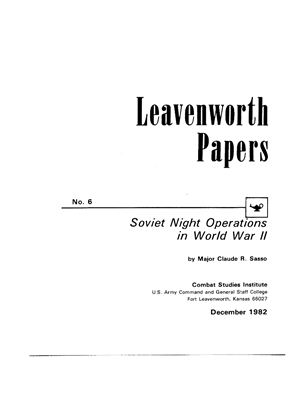Combat Studies Institute, 1982 - 66 p. (eng)
One of the more perplexing problems contemporary military planners face is that of conducting night operations. Psychologically, night has always been a realm of the unknown and the uncertain, magnified by imagination. While dealing with this psychological barrier to the conduct of battle at night, the soldier must also cope with a myriad of more tangible problems. Coordination of forces in battle at night tests the mettle of the most proficient leader and the most highly trained force. Yet, the fact is that those armies that can operate successfully at night have a marked advantage over adversaries who cannot.
This study examines the extensive experiences of the Soviet Army as it struggled to master the night. Driven by necessity to operate in the relative safety of darkness, the Soviet Army in World War II leaed to capitalize on night operations and to exploit that capability in its quest for victory over the German Army, The Soviets have not forgotten that experience, and since the war, they have emphasized the advantages of night combat, As they train for night operations, they closely study the experiences of World War II in the belief that certain basic techniques and conditions of battle transcend time and the vagaries of technological change.
One of the more perplexing problems contemporary military planners face is that of conducting night operations. Psychologically, night has always been a realm of the unknown and the uncertain, magnified by imagination. While dealing with this psychological barrier to the conduct of battle at night, the soldier must also cope with a myriad of more tangible problems. Coordination of forces in battle at night tests the mettle of the most proficient leader and the most highly trained force. Yet, the fact is that those armies that can operate successfully at night have a marked advantage over adversaries who cannot.
This study examines the extensive experiences of the Soviet Army as it struggled to master the night. Driven by necessity to operate in the relative safety of darkness, the Soviet Army in World War II leaed to capitalize on night operations and to exploit that capability in its quest for victory over the German Army, The Soviets have not forgotten that experience, and since the war, they have emphasized the advantages of night combat, As they train for night operations, they closely study the experiences of World War II in the belief that certain basic techniques and conditions of battle transcend time and the vagaries of technological change.

